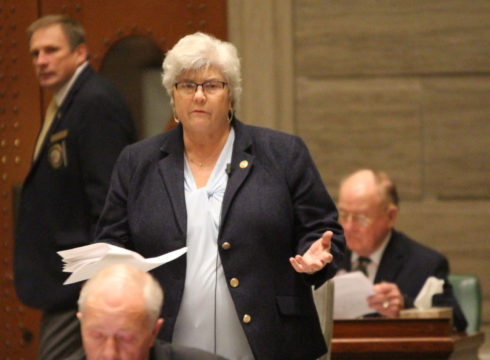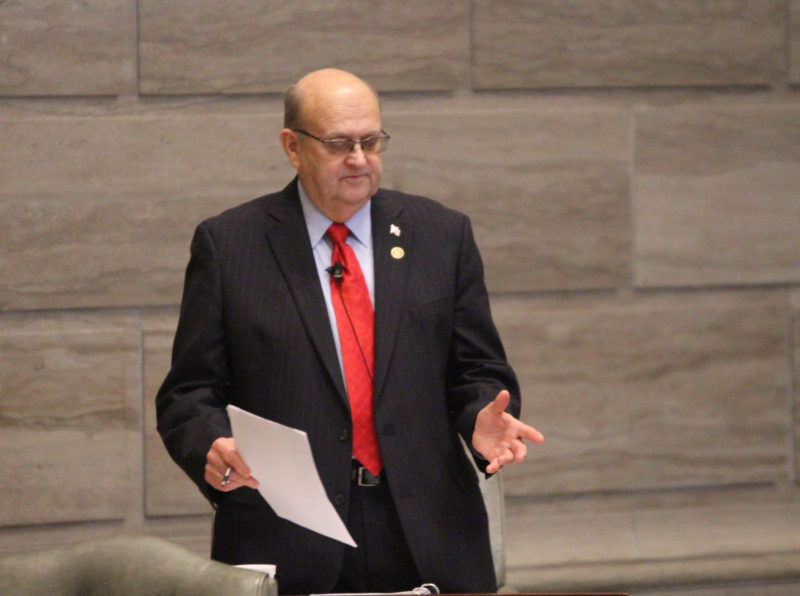Senate bill presumed to be going to Greitens’ desk
JEFFERSON CITY, Mo. – After years of effort, Senate Republicans passed Sen. Dan Brown’s right-to-work bill out of the chamber for the last time Wednesday night. Democrats debated for roughly 10 hours over the last three days before finally ending their years-long defense against what they see as an anti-union piece of legislation.
The perfecting of SB 19 marks the latest measure in a long line of legislative steps before a right-to-work bill inevitably arrives on Gov. Eric Greitens’ desk. It was perfected 21-12, with all Democrats opposing it. Republican Sens. Gary Romine, Ryan Silvey, and Paul Wieland joined with the Democrats to unsuccessfully vote the measure down.
However, most of the Republicans remained silent over the three days of debate. Democrats utilized many of the same tactics they have the past few years to combat conservative labor reform measures. They offered multiple amendments, debated every word of the bill at length and postulated on the possibilities that could arise from passage of the bill. Sen. Jamilah Nasheed managed to sneak in a few of her patented quorum calls, and senators spoke on topics ranging from Martin Luther King Jr. to recidivism in Missouri prisons.
Just before 5 p.m. Wednesday, after the last of the Democrats’ many amendments had failed, Minority Floor Leader Gina Walsh stood to deliver one last speech. The entirety of the speech can be read at the end of this article.
Walsh herself served as a union member in the International Association of Heat and Frost Insulators and in union leadership as president of the Missouri State Building & Construction Trades Council. For her, the eventual passage of the bill marks a transition away from appreciating the laborers who helped build the state and the country.
“Right-to-work is wrong for Missouri, and my heart breaks for the working class families of this state that will suffer under its impact,” she said on the floor. “Lower wages, fewer jobs, and an irreparable wound upon the fabric of our nation.”
Brown’s bill still needs to be third read and officially passed, but Walsh’s speech signaled the end of the effort against the bill. Once passed out of the Senate, SB 19 will be handled by Rep. Holly Rehder. The House already passed out her version of right-to-work legislation earlier in January. Brown’s bill will likely be the one to continue on the legislative process to avoid putting right-to-work through the Senate again.
Rehder said she hopes to get to work on Brown’s bill as early as next week.
“Morally the right thing to do”
Republicans, on the other hand, were ecstatic.
Sen. Bob Onder recalled knocking doors for the 1978 right-to-work ballot initiative. He said the bill was “long overdue.”
“First, it’s morally the right thing to do,” Onder said. “No one should be fired for refusal to join or support a union by paying dues. Secondly, this is one of many things Missouri needs to do to turn itself around economically so Missourians can have the jobs and economic opportunities Missourians deserve.”
Majority Floor Leader Mike Kehoe agreed with Onder, and he noted the Senate had worked the way it should during the three days of debate.
“It’s supposed to slow things down and allow a deliberate debate,” he said.
Many wondered if Democrats would push the Republicans would have to move to previous question as they did on 2015’s right-to-work bill or last year’s 39-hour filibuster on SJR 39. But after the debate, Walsh said a full-hearted filibuster was never truly in the cards.
“I don’t think it’s fair to blow this chamber up over something that’s inevitable. I can count,” she said. “We knew this was going to happen, and as long as we had fair, free and open debate, I was satisfied with that.”
Next steps for labor?
In her office after the Senate adjourned for the night, Walsh was greeted by leaders of Missouri’s organized labor movement. She shared a bittersweet hug with AFL-CIO President Mike Louis. A framed copy of the St. Louis Labor Tribune from 1978, yellow and weathered with the headline “Missouri Wins!” in fading letters, hung behind them. It was not entirely the end of the fight, but it was a battle they had lost. Louis has initiative petitions effectively repealing right-to-work ready to go onto 2018’s ballot. But by August, right-to-work, which Missouri’s labor movement has successfully resisted for decades, will become the law of the land.
The sting of that reality meant a lot to Walsh, who experienced personally what union membership could mean to a struggling family.

“I carried a union card, I had benefits, I made a lot of money because I worked a lot of overtime,” she said. “I had three girls in school: two in private high school and one in college. Somebody, if I hadn’t had the card, wasn’t going back to Incarnate Word Academy. The tuition was 10 grand a year. That’s $20,000 out of your household income.
“It was that important, it’s what made us be able to survive as a family after my husband died. The kids, financially, never missed a beat. It was a bad time for them, they lost their father, but I could give them that.
“I couldn’t have given them that, had I not chosen the path I chose.”
